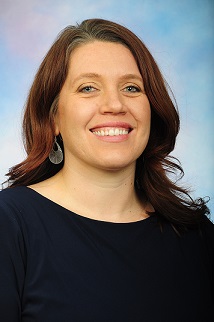
Theresa Hastert, Ph.D., assistant professor of Oncology for the Wayne State University School of Medicine and the Barbara Ann Karmanos Cancer Institute, has secured a five-year, $729,000 grant from the American Cancer Society for her research project, "Economic Consequences of Cancer Survivorship." Her grant runs through June 2022.
Her co-investigators include Ann Schwartz, Ph.D., M.P.H., Karmanos Cancer Institute deputy center director and WSU professor of Oncology; Susan Eggly, Ph.D., associate professor of Oncology; Hayley Thompson, Ph.D., associate professor of Oncology and leader of the KCI Population Studies and Disparities Research Program; Michael Simon, M.D., M.P.H., professor of Oncology; Gail Jensen Summers, Ph.D., WSU professor of Economics and director of Training at Wayne State University's Institute of Gerontology; and consultant Amy Davidoff, Ph.D., of the Yale Cancer Outcomes, Public Policy and Effectiveness Research Center at the Yale School of Medicine.
"Many cancer survivors and their families face substantial economic burdens related to cancer treatment, including out-of-pocket costs, non-medical expenses and changes to employment status," Dr. Hastert said. "These burdens are associated with poor quality of life in survivors and may impact treatment decisions."
Although researchers are beginning to focus on these economic burdens, she said, the most important components of economic burden for cancer survivors are not clear. Many measures being developed are based on information largely from white survivors. These may not represent the experiences of all survivors, and could underestimate the economic burdens experienced by other groups.
Dr. Hastert's study will use various research methods to gain a deeper understanding of the economic consequences of cancer survivorship among both white and African-American survivors in metropolitan Detroit. She and fellow researchers will use data from the Cancer Survivorship in Metropolitan Detroit cohort study to examine the prevalence and predictors of economic burden, and whether they differ by race or socioeconomic status.
The study includes adult survivors who were diagnosed with breast, colorectal, lung or prostate cancer since Jan. 1, 2013, and completed a questionnaire online or by phone. Dr. Hastert and her fellow researchers also will use focus group and interview data from CSMD participants and survivors in rural areas in Michigan to better understand diverse survivors' experiences related to the economic outcomes of cancer and to identify the most important burdens among diverse survivors.
Using research results, they will develop a measure of economic burden that reflects the experience of diverse survivors. They also will examine whether economic burden is associated with the treatments survivors received, quality of life and health behaviors, and whether those associations are the same for survivors of different race or socioeconomic status. Finally, Dr. Hastert and her collaborators will interview health care providers, including physicians, nurses and social workers, to examine their perspectives related to cancer patients' concerns about treatment-related costs, the resources available and the barriers the providers experience in effectively addressing those concerns.
"This work will fill important gaps in our knowledge and understanding of the economic consequences of cancer survivorship, including how experiences differ between white and African-American survivors, what types of economic burdens have the biggest impact on survivors, how those burdens relate to health outcomes, and what providers see as important obstacles and opportunities to address financial outcomes for cancer survivors," Dr. Hastert said. "The research conducted through this grant will provide the knowledge necessary to identify the most serious burdens experienced by diverse cancer survivors and the most promising points of intervention to address those outcomes."